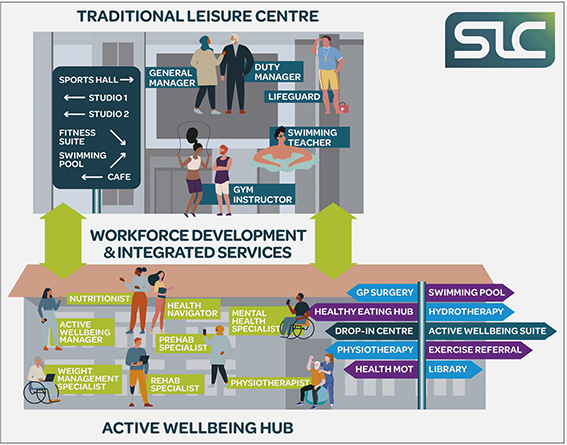
Many Councils have an aspiration to shift the emphasis of their services from ‘leisure' for the more active members of their community to active wellbeing ‘for the many'.
This new concept of ‘pivoting' from leisure to active wellbeing heavily influenced Sport England's Future of Public Sector Leisure report. It builds on the ground-breaking Pivot to Active Wellbeing Programme in Greater Manchester which SLC supported.
SLC's evolving definition of the pivot is:
‘The transformation of leisure services towards a more integrated health, social care and wellbeing offer.'
This enables leisure services to play a more impactful role in improving population health over time as part of a wider, place-based approach.
For those Councils delivering services through arrangements with an operator partner, there is an opportunity three-four years away from the end of a leisure contract to take a radical look at the service offer.
The leisure / active wellbeing procurement market is again delivering significant financial and social value returns to Councils prepared to invest in their assets and localities.

So, what are the main differences between a standard leisure contract and an active wellbeing partnership?
Are there opportunities to reshape the facility mix and services to support preventative health?
There are three key differences; the specification, the facilities and the approach to partnership.
1. The specification
The emphasis of the services specification is on meeting the needs of the less active and inactive as well as those active within your community. This is often aligned to a clear policy position on the Council's strategic priorities.
This requires an insight-led approach to pricing and programming activities, classes, events and enabling support both within the facility and in the community.
It can provide support in partnership with health and social care partners with prehabilitation, rehabilitation, musculoskeletal health (strength and conditioning), flexibility, balance and maintaining a healthy weight. This is often as part of a wider whole system approach to population health.
This provides an opportunity to build a strong evidence base with partners and to demonstrate value for money. Use of new Treasury social value measures such as the WELLBY will become increasingly common to demonstrate the social value being delivered.
There will be opportunities for workforce transformation. SLC has been seeking to promote sector wide transformation nationally to equip the future active wellbeing workforce with the specialist skills and capacity to have a greater impact on local population health.
2. The facilities
SLC has been leading pioneering design work with local authorities such as Wigan Council to explore and develop the facility mix of active wellbeing community hubs with strategic partners. In many cases this can be applied to existing older sites in need of remodelling / refurbishment.
This creates the potential to challenge the traditional mix of gym and swim leisure facilities. There is real potential to evolve into more inclusive and impactful community active wellbeing hubs. North Yorkshire Council (with SLC's support) has recently made a policy commitment to transform its portfolio in the future and many other councils are set to follow.
Wigan Council has been exploring adapting its existing leisure facilities into Active Wellbeing Hubs through some recent masterplanning work linked to GM Pivot to Active Wellbeing Programme which SLC has supported.

3. The approach to partnership
A traditional leisure contract has a client / contractor spilt - a regime based on client monitoring and contract compliance. Modern outcomes-based partnerships are designed to work effectively based on a sustainable business model, creating the conditions for real collaboration. Key features include:
- Locality-based services enabled and delivered in the community
- Health and social care partners collocated on site linked to an integrated range of wrap-around services
- Multi-skilled workforce able to support more people with complex conditions
- Services meeting the needs of a broader set of user groups including the less active
- Emphasis on place-based working as part of a whole system approach.
Find out more:
- SLC will be running a free virtual Procuring an Active Wellbeing Partnership Think Tank seminar – Highlighting the key differences between a standard leisure contract and an Active Wellbeing contract and exploring service redesign on Thursday 20 June 10am – 12pm for local authority public health, leisure and community leads. We will explore recent case studies including presentations from Northumberland Council and North Yorkshire Council and learning from range of councils SLC has worked alongside.
- To request a place at our Think Tank or to book an exploration session and receive the free State of the Leisure Procurement Market report, email us at info@slc.uk.com.
- We are also offering the opportunity for a one hour session with our Directors to explore your current circumstances and ambitions to explore active wellbeing in more depth.
Duncan Wood-Allum Managing Director of SLC has recently appeared in the Sports Think Tank Podcast on the Sports Manifesto for the upcoming 2024 election.
Listen to the podcast on the future of public sector leisure and the pivot to active wellbeing here.
www.slc.uk.com | 01444 459927 | info@slc.uk.com

